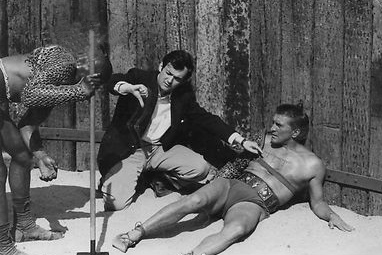
TORONTO—Stanley Kubrick was a perfectionist who cared fiercely about every detail in his films, says his widow as a new exhibit chronicling his life’s work opens in Toronto.
“A perfectionist is someone who really thinks he’s never perfect. And he tried to be,” said Christiane Kubrick in an interview at TIFF Bell Lightbox.
“He cared a great deal. And he didn’t analyze himself or think about a great deal, he was very much in the moment as they say these days. He cared enormously about everything. Also, he observed that that was much more fun than being kind of blase.”
“Stanley Kubrick: The Exhibition” gathers about 1,000 artifacts from his films—among them the typewriter from “The Shining,” HAL 9000’s massive camera lens from “2001: A Space Odyssey” and the iconic costumes of “A Clockwork Orange”—and crams them into some 7,000 square feet.
It’s the largest exhibit ever seen at the Lightbox, says director of film programs Jesse Wente.
“The challenge is really how do you fit all of that stuff into sort of a smaller, into that space. Luckily our designers Laurel MacMillan and Barr Gilmore really looked at that, solved that issue and then created really intimate spaces and rooms for each film that you could explore,” he said in an interview.
Cinephiles can listen to Richard Strauss’s iconic “Thus Spoke Zarathustra” while gazing upon a replica of the “2001: A Space Odyssey” monolith, admire specks of fake blood on the twin girls’ dresses from “The Shining,” and even read letters from outraged church leaders about “Lolita.”
Kubrick’s keen eye for detail is apparent in every item, but his longtime producer and brother-in law Jan Harlan says the legendary filmmaker was more flexible than many realize.
“Very often, this word (perfectionist) is used like a criticism. It’s absolutely true he was not a slob. He wanted to get it right. But he was ready to make compromises,” he said.
For example, Harlan said, Kubrick initially wanted to cast 18- and 19-year-olds in “Full Metal Jacket” to reflect the real demographics of the Vietnam War. But when he couldn’t find teenagers with the emotional maturity to be strong actors, he cast older men.
“I’m sometimes asked, ‘Was he afraid of anything?’ The correct answer would be that he was afraid of mediocrity. And he successfully avoided it,” said Harlan.
“None of his films have disappeared. They’re all there. Go back to ‘Paths of Glory,’ ‘Lolita,’ ‘Dr. Strangelove.’ They’re more relevant than ever. ‘2001.’ They’re all there. Nothing has disappeared. That’s the mark of a great artist.”
The Lightbox is also showing Kubrick’s first documentary short “Day of the Flight,” made in 1951 when the director was only 23. A 70-millimetre presentation of “2001: A Space Odyssey” will screen, as well as a rarely shown international version of “The Shining” that removes 25 minutes of expository footage to create a more oblique film.
Gary Lockwood and Keir Dullea, the stars of “2001: A Space Odyssey,” will present a screening of the seminal film on Saturday at 2 p.m.
In a telephone interview, Lockwood said Kubrick was “knowledgeable about every facet of filmmaking there was,” and certainly a perfectionist when it came to the technical side.
“He could’ve lit it, he could’ve shot it, he could have held the cameras, he could load the film. He was the man. There was no one ever like him,” he said.
“Kubrick had this incredible insight. People sit down in these dark movie houses and they watch movies and they become absorbed. The way to get their attention is to make everything as realistic as possible.”
Dullea recalled that when he first heard Kubrick had died of a heart attack in 1999 at age 70, his immediate reaction was that it was a huge loss for film lovers.
“The first thought that came to me are all the great films that we will never see,” he said.
“And you know, my thanks, my silent thanks to the man for having exposed me to the experience of making ‘2001’ and being a part of what has ended up being such an iconic film.”
“Stanley Kubrick: The Exhibition” runs until Jan. 25. For screening times of the film program, “Stanley Kubrick: A Cinematic Odyssey,” see tiff.net.